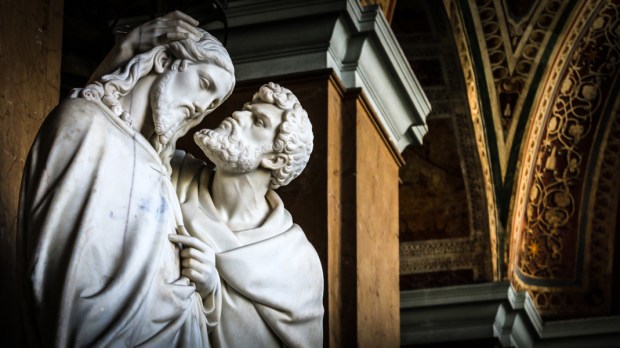What are we praying for in the Our Father (Part VI)
This is the down side of “forgive us our sins,” this second half of the fifth petition. You can read about the first half here. I say downside because of all the things our Lord asks, this may be the toughest. I know. I had an uncle murdered and a brother-in-law shot by police. Neither was justified. Outrage was my dominant emotion, and, yes, hate.
Yet Jesus has a way of softening up the conscience, of making us more sensitive rather than less.
When we begin to think of ourselves as in Christ, then we begin to examine ourselves by his death for us and, inconveniently, for our neighbor as well. The more aware we are that it was for my sins that Christ died and the more relentlessly we are moved to pray “forgive us our sins,” then just as unrelentingly we are prodded to say, “as we forgive those who sin against us.”
Most people want to do the right thing by us and most of us want to do the right thing by them. That’s the first thing to keep in mind.
So here we ask God to help us to be gracious to our neighbors, in the same way God has been gracious to us. Christ’s word not only challenges us to forgive as we have been forgiven. His word also teaches us to seek his strength that we may rely on his courage, rather than our own, to forgive others.
For grievous sin, however inadvertent or accidental, it doesn’t happen in a snap, and you should not expect it to. Some things do touch unfathomable depths.
I knew a man who would clamp his mouth at the petition, “as we forgive those who sin against us.” The woman who had killed his son was a member in the same church.
My first week in my first parish as a new Lutheran pastor, I drove out to the small country church, half of the two-congregation parish I served. I had never seen it, didn’t quite know where to find it, so I thought I should do that before showing up to preach the next day.
I saw a guy watering flowers in the church cemetery. It was George. He took me on a tour of the grave stones and in about twenty minutes I knew more dead parishioners than live ones. He took me to a new marker. “That’s my son; car accident.” Jason, 17 in 1978, died two years before I arrived in the parish.
This brings me to Ethel, the other parishioner. Ethel had glaucoma. Her vision narrowed like she was seeing through a tunnel. Her license should have revoked years before, but it was a small rural county, 16,000 tops, and officials (who were probably all relatives one or another way) made allowances. She was a farm wife, and a farm wife who couldn’t run errands, given the harsh practicalities of rural life, was, well, pretty useless.
Ethel was no longer driving when I met her. She had not been driving since two years before when, on a late hazy afternoon, she T-boned Jason’s car broadside at a gravel-road intersection and killed him outright.
When it came to the Lord’s Prayer, forgiving others, George told me he’d shut up if it meant Ethel was in the deal. He couldn’t pray it. He couldn’t force the words from his mouth.
The worst thing that ever happened to George and his wife was Jason’s death. The youngest of three children, the others grown and gone, Jason was the son born to continue the farm into its fourth generation.
Yet the woman responsible for his death was there in that little church with George every Sunday; he seated to the front, she to the rear, their customary pews. He was polite, but he could not speak those words “as we forgive.”
Nor could he banish them from his mind and there they rattled, giving the Holy Spirit something to work with.
I’m not going to tell you that George had a healing change of heart one day and everything suddenly was rainbows and unicorns. He didn’t, and it wasn’t.
Forgiving others is painful, I have learned, mostly by watching those who manage it better than I. Some sins we are asked to forgive in others are a true burden of the cross, and we endure the forgiveness and the forgiven sin through life.
In the end, George did it, more by doing it than saying it. Passing the peace one Sunday, George deliberately left his seat in the front, walked length of the aisle to the rear where Ethel stood. There he shared the peace of Christ with the woman who killed his son. George did not tell me this story. Ethel did.
It became apparent to me that talk of forgiveness in that little church carried the tension, the intensity, and the unqualified drama of grace. Ethel died many years ago; George too, as I hear. But this story, it lives still.
Because Christ is raised, we know he will not only forgive us our inability to forgive, but at the same time he will also continue to work in us and upon us until we are brought to the place where — in our love of Christ and of neighbor — we can do nothing else but forgive.
Previously: Forgive us our sins…
Next: Lead us not into temptation

